Publications
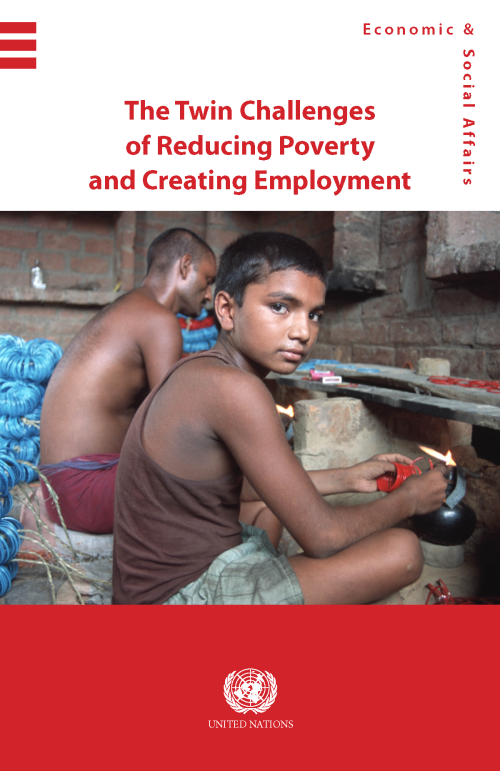
This E-publication is based on papers presented at two Expert Group Meetings (jointly organized by DSPD and the ILO) that brought together specialists to undertake a review of progress in eradicating poverty and to analyse policy responses to the global jobs crisis in different countries and regions of the world. It calls for a reorientation of macroeconomic policies from the current heavy emphasis on short-term stability to the promotion of sustained, inclusive and equitable growth. It stresses the need for the integration of social and economic policies to enable the attainment of people-centred development outcomes.
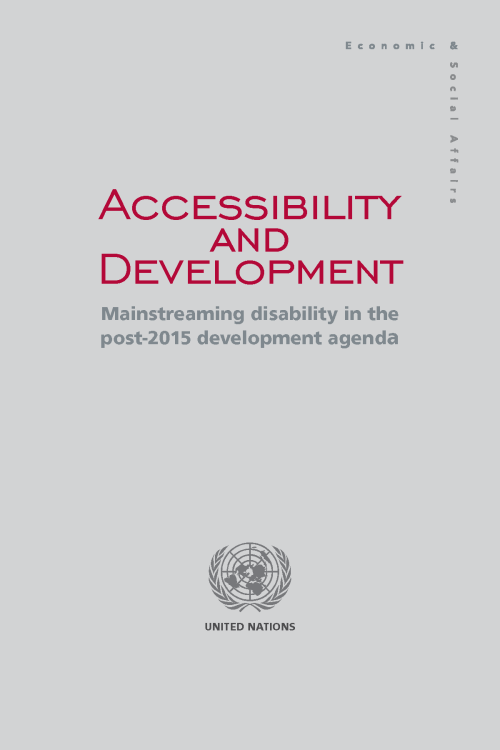
The publication reviews the concept of accessibility and its role in achieving inclusive and sustainable development. It propositions that accessibility be, not only a means and a goal of inclusive development, but also an enabler of an improved, participative economic and social environment for all members of society, including persons with disabilities.
Three key issues are addressed in the publication: (1) Accessibility in the context of human rights and development; (2) accessibility in policy and practice; and (3) accessibility and a disability-inclusive post-2015 development agenda.
The publication reviews good practices and lessons learned from both top-down and…
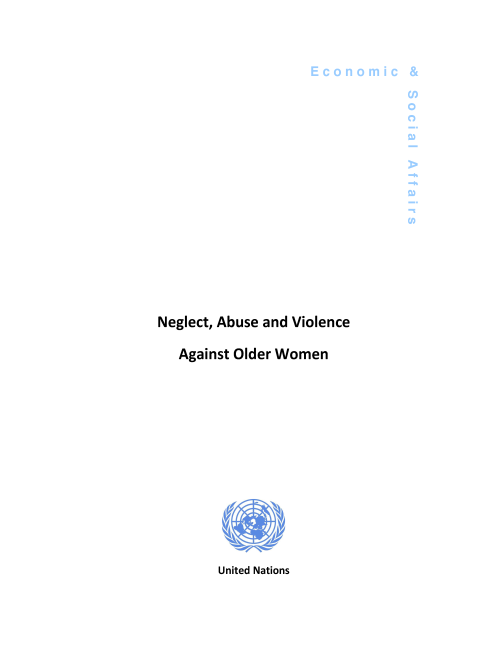
The objective of the Madrid International Plan of Action on Ageing (MIPAA) was the elimination of all forms of neglect, abuse and violence against older persons (MIPAA, 2002).
The United Nations Department of Economic and Social Affairs (UN-DESA), together with its focal point on ageing in the Division for Social Policy and Development (DSPD), began a discussion based on current research, available data and the terminology used in academic circles to describe and classify violence and abuse against older women. The majority of academic research and discourse has been conducted in developed countries, and agreement on terminology and meanings has—by no means—been clear or agreed.…
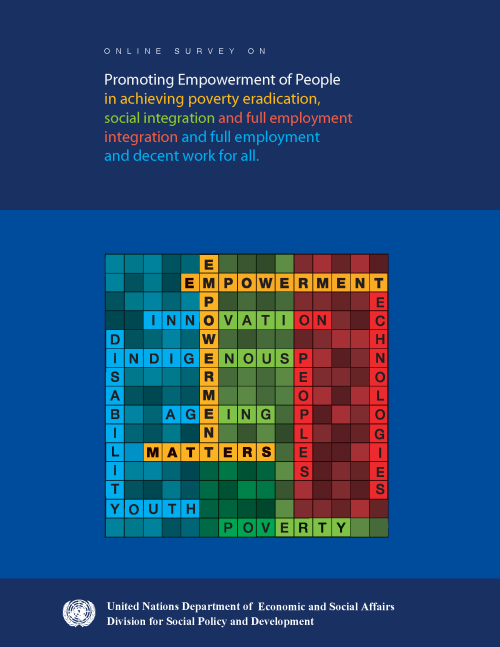
UNDESA-DSPD, from 8 August to 5 September 2012, conducted a global online survey to gather inputs for consideration by the 51st session of the Commission for Social Development (CSocD), which took place from 6 to 15 February 2013.
The survey enabled the public worldwide to respond to a set of questions that were related to the priority theme of CSocD on “Promoting empowerment of people in achieving poverty eradication, social integration and full employment and decent work for all”.
The responses collected and selected from the first question “Empowerment: What does it mean to you?” was published in a separate booklet.
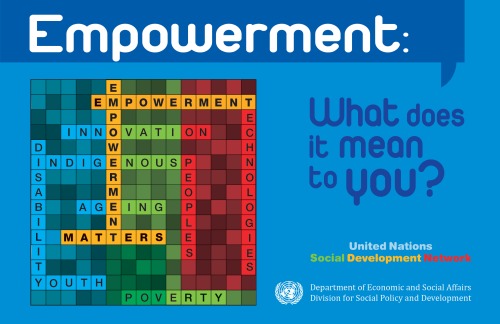
The “Definitions of Empowerment” represents a collaborative effort, made possible by the answers received from people all over the world on the Empowerment theme. Their invaluable contributions were essential for the preparation of the Empowerment Publication.
In order to collect people’s ideas and experiences, the Division for Social Policy and Development (DSPD) of UNDESA launched an on-line survey on “Promoting Empowerment of People”.
We were glad to receive tens and tens of responses from young individuals, persons with disabilities, older persons, and people working for various institutions and organizations committed to social development issues. Their keen interest…
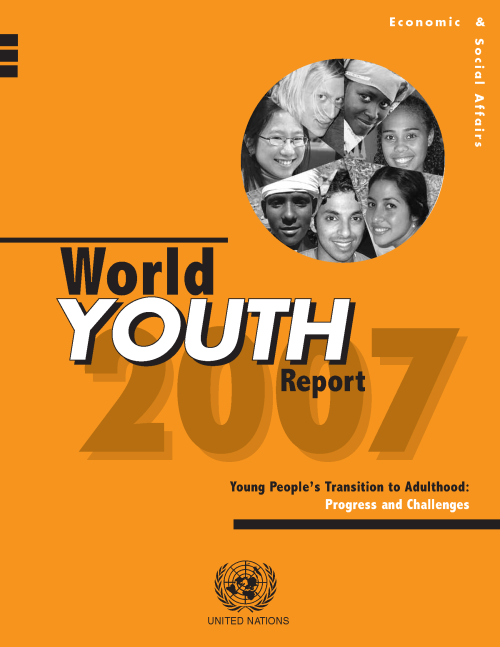
The World Youth Report 2007 examines the challenges and opportunities existing for the roughly 1.2 billion young people between the ages of 15 and 24 in the world. Distinct from the 2003 and 2005 editions, it provides a regional overview summarizing the major youth development trends in the fifteen priority areas of the World Programme of Action for Youth.
The report explores major issues of concern to youth development, including employment, education, health, poverty and violence. At the same time, it highlights youth as a positive force for development and provides recommendations for supporting their essential contributions.
“The social, economic and political costs of a prolonged youth unemployment crisis are high. It is therefore obvious that there is an urgency in addressing the youth employment crisis, but youth employment cannot be tackled without the involvement and participation of youth. It is with this in mind that the current World Youth Report is dedicated to the voices of young people themselves,” said Ms. Daniela Bas, Director of UN DESA’s Division for Social Policy and Development at today’s launch.
Released in December 2011, the report Disability and the Millennium Development Goals: A Review of the MDG Process and Strategies for Inclusion of Disability Issues in Millennium Development Goal Efforts, examines the MDGs and its relation to disability issues with a view to impact the post-2015 development agenda. It is intended to provide a “road map” for how and why disability can and should be included in the planning, monitoring and evaluation of MDG-related programmes and policies.

The report focuses on the social and economic wellbeing of older persons and documents the demographics of older age; their economic status and participation in the labour force; the health of older persons; and the societal perceptions and social integration of older persons. On each of these topics, the report attempts to account for the diversity of situations of older persons in society and across the world. It also attempts to capture the changing reality and perceptions of old age as well old persons’ own views.
The report is based on recent research and empirical data from various sources available to the United Nations Secretariat, and includes a range of up-to-…
“The economic crisis reminds us that it is essential for people to be healthy, educated, adequately housed and well fed to be more productive and better able to contribute to society,” said Jomo Kwame Sundaram, DESA’s Assistant Secretary-General for Economic Development. “Social policy should be an integral part of economic policy.”
The perceptions of the role of women and men in families have changed over the past few decades. Men are no longer perceived as the economic providers to families. The role of men in the family has undergone many “diverse demographic, socio-economic and cultural transformations” impacting the formation, stability and overall well-being of families. In light of this development, DESA’s Division for Social Policy and Development (DSPD) launched a new publication on “Men in Families and Family Policy in a Changing World” on 17 February focusing on the shifting roles and views of men in families.
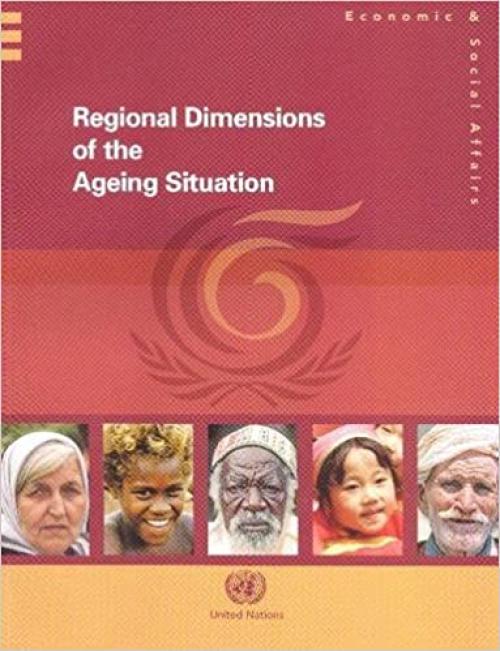
This Publication contributes to the series of events, conferences and publications related to the first review and appraisal of the Madrid International Plan of Action on Ageing. It highlights priorities, as well as recent trends and policy developments, in the five UN regions of the world.
The publication, which is a joint effort of UN staff and international experts, aims to assist national governments, the international community and the public at large to better assess the situation of older persons five years after the Second World Assembly on Ageing. It should better inform the debate on how to align priorities, policy innovations and technical cooperation to implement the…
 Welcome to the United Nations
Welcome to the United Nations